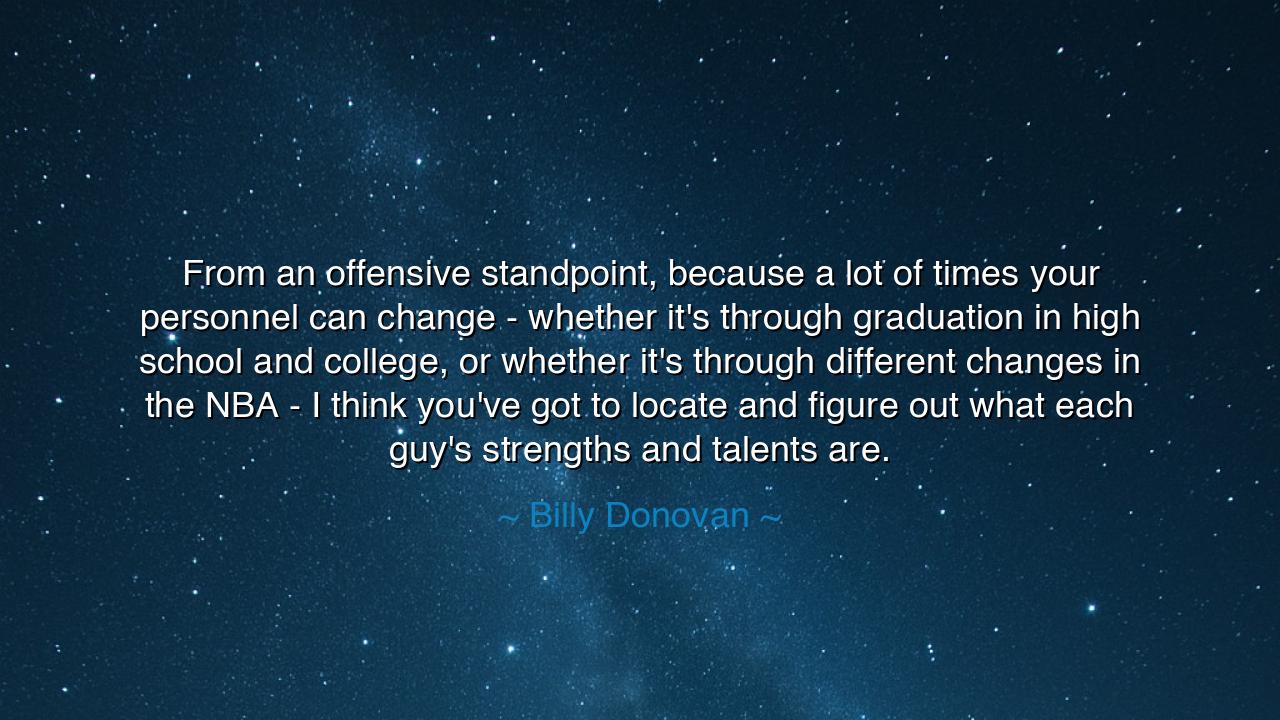
From an offensive standpoint, because a lot of times your
From an offensive standpoint, because a lot of times your personnel can change - whether it's through graduation in high school and college, or whether it's through different changes in the NBA - I think you've got to locate and figure out what each guy's strengths and talents are.






The words of Billy Donovan — “From an offensive standpoint, because a lot of times your personnel can change — whether it's through graduation in high school and college, or whether it's through different changes in the NBA — I think you've got to locate and figure out what each guy's strengths and talents are.” — speak not merely of the game of basketball, but of the deeper game of leadership, adaptation, and understanding the human spirit. Within this reflection lies an ancient wisdom: that no strategy, no vision, no triumph can endure without first knowing the strengths of those who walk beside you.
From the earliest days of civilization, wise leaders have known that every person holds a distinct light — a talent, a rhythm, a fire — that must be recognized before it can serve the greater purpose. The coach, the commander, the king, the teacher — all must learn this same truth: you do not lead an army of shadows, but of souls. Each soul moves differently, fights differently, dreams differently. Thus, Billy Donovan’s teaching becomes a modern echo of an ancient principle: to lead is to perceive, and to perceive is to honor the divine uniqueness of others.
Consider the great story of Alexander the Great, whose empire spanned continents not merely by his own brilliance, but through his ability to read the hearts and gifts of his men. He placed the swift where speed was needed, the strong where might was required, and the cunning where subtlety triumphed. He knew that no soldier should be asked to fight against his nature, for victory comes when the individual’s talent meets the team’s purpose. So too must the modern coach — or leader of any kind — become a seer of strengths, shaping his plans not from rigid desire, but from living awareness.
Billy Donovan, in his wisdom, speaks of the ever-changing personnel — the transient faces of a team, whether through graduation, trades, or the passing of time. This change mirrors the condition of all life. People come and go, seasons turn, and the circle of those we rely upon is never constant. But amid that change, the eternal task remains: to look upon each new face and ask, “What power sleeps within this one?” This question is not merely strategic — it is spiritual. It demands patience, empathy, and the humility to understand that greatness never wears the same uniform twice.
In this teaching lies a challenge to every leader, artist, or dreamer who works among others. We are often tempted to impose our own vision upon the world — to demand that others fit the mold we’ve already shaped. Yet, as Donovan reminds us, wisdom is not in molding people, but in unfolding them. The master does not carve a statue; he frees the form already hidden within the stone. Likewise, the wise coach does not force players into his system — he builds his system around their gifts. The wise parent does not command the child’s destiny — he listens for the song the child is meant to sing.
We see this truth in every field where greatness endures. When Steve Jobs built Apple, he did not seek to fill roles with identical minds; he sought those whose gifts burned differently — designers, engineers, visionaries — each bringing a distinct fire that, together, became brilliance. When Phil Jackson coached Michael Jordan and later Kobe Bryant, he did not rule them by control but guided them through understanding — teaching them to harmonize their individual power within the flow of the team. The lesson is the same: the true leader learns to conduct the orchestra, not to play every instrument himself.
And so, let this be a teaching for all who would build or lead: learn the art of seeing. Seek not only the errors of others but their excellence. Speak not only of what must be fixed, but of what must be freed. When you gather a team — whether in sport, work, or life — take time to study each spirit. Ask yourself: What does this person do effortlessly? Where does their confidence live? What beauty arises when they are unafraid? From these answers, shape your vision, and it will endure through all change.
Therefore, the lesson of Billy Donovan’s words is this: change is inevitable, but understanding is eternal. The leader who honors each person’s gift builds something that time cannot easily destroy. So in your own life, whether you lead two people or two hundred, become a discoverer of strength. See the talent hidden beneath hesitation, the courage beneath silence, the wisdom beneath inexperience. When you can see others not as pieces to be moved, but as souls to be revealed, then — and only then — will your team, your family, your life’s work, move with the harmony of victory.






AAdministratorAdministrator
Welcome, honored guests. Please leave a comment, we will respond soon